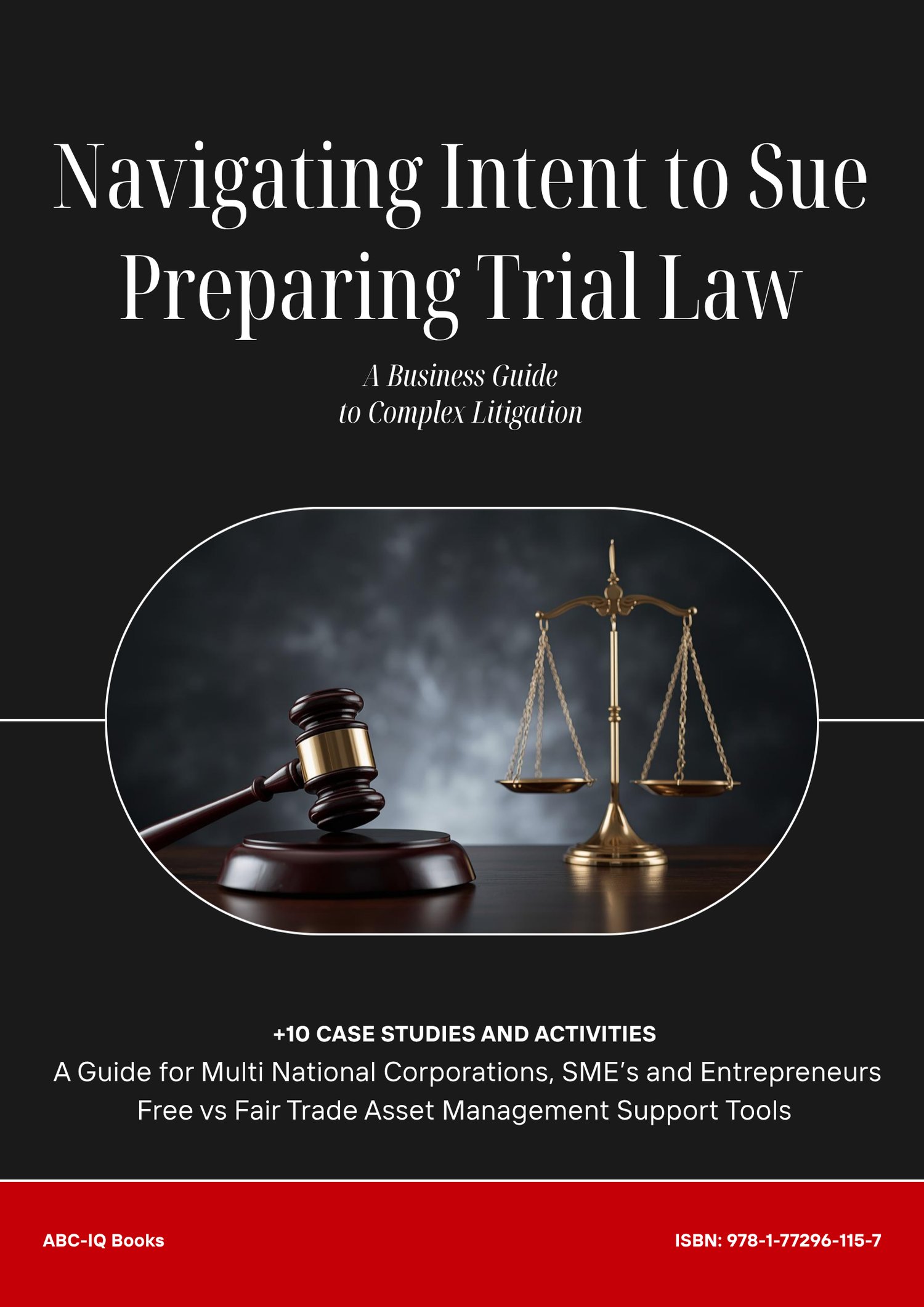
Navigating Intent to Sue Preparing Trial Law, A Business Guide to Complex Litigation Brand Awareness A Guide for Multi National Corporations and SME'S +10 Activities Fair vs Free Trade
📘 Navigating Intent to Sue: Preparing Trial Law
A Business Guide to Complex Litigation & Brand Awareness
ISBN: 978-1-77296-115-7 | ABC-IQ Books
💼 Who It’s For
- Business owners seeking to protect their brand and assets through legal literacy.
- Law students, entrepreneurs, and executives preparing for trial, arbitration, or business disputes.
- Educators and consultants teaching advanced law, ethics, and brand management.
- Policy makers and advocates exploring fair vs. free trade and global litigation strategies.
📖 What You Get
- A step-by-step guide to litigation readiness — from “intent to sue” through negotiation.
- 10 hands-on legal literacy activities that strengthen negotiation, evidence, and argumentation skills.
- Insight into the difference between fair and free trade — and how each impacts business law.
- Strategic frameworks for brand defense, risk management, and complex case navigation.
- Professional templates and self-assessment tools for managing conflict before it becomes crisis.
⚖️ How It Helps
- Builds your confidence and clarity when facing legal threats or commercial disputes.
- Transforms complex law into practical business intelligence for everyday decision-making.
- Equips you with tools to identify ethical, sustainable, and profitable legal strategies.
- Enhances your organization’s brand awareness through lawful communication and integrity.
- Helps bridge the gap between corporate accountability and human understanding in modern trade.
🧠 Bonus Section: +10 Activities – Fair vs. Free Trade
A guided exploration of global trade ethics, market equity, and international policy. These exercises challenge readers to evaluate business practices through the lenses of law, fairness, and long-term sustainability.
Excerpt
PBL assistive strategies to support executive decision making protecting brand through lateral liability.
Understanding Intent to Sue
Definition and Importance
In the realm of litigation, understanding the definition and importance of intent to sue is crucial for businesses navigating complex legal landscapes. Intent to sue refers to a party's decision to pursue legal action against another, which is often a precursor to formal proceedings. This concept is not merely a procedural formality; it reflects a strategic choice that can significantly impact a company's brand and reputation. Recognizing this intent allows businesses to prepare for potential litigation and mitigate risks associated with negative publicity and financial loss from R and D to commercialization.
The importance of clearly defining intent to sue cannot be overstated. For companies, especially those involved in high-profile cases, the stakes are elevated. The decision to initiate legal action can lead to jury sequestration, affecting how cases are perceived in the public eye. This process is designed to shield jurors from outside influences, ensuring a fair trial. However, it can also lead to heightened scrutiny and potential damage to a brand’s reputation. Understanding these dynamics helps businesses craft legal strategies that protect their interests while maintaining brand integrity.
Moreover, intent to sue plays a pivotal role in lateral liability considerations, particularly in corporate law.
Review of brand awareness, reputation, and the impact. Factoring Berkus pre sales valuations of 1.7 Million+ capital gains, with declared interests. Brand Value Berkus 1.7 Million USD
In the realm of complex litigation, understanding the value of a brand can be crucial, especially when it is quantified at 1.7 million USD, as highlighted by the Berkus method. This approach emphasizes the significance of brand awareness and reputation, particularly in cases where intent to sue is a key factor. For businesses, this valuation is not just a number; it represents the potential risks and rewards that come with brand identity and consumer perception. When faced with litigation, companies must navigate the nuances of brand value in a way that protects their interests.
Unit of Study
#abciqtips
💼 Who It’s For
- #BusinessOwners seeking to protect their #brand and #assets through #LegalLiteracy.
- #LawStudents, #Entrepreneurs, and #Executives preparing for #Trial, #Arbitration, or #BusinessDisputes.
- #Educators and #Consultants teaching advanced #Law, #Ethics, and #BrandManagement.
- #PolicyMakers and #Advocates exploring #FairTrade vs. #FreeTrade and global #LitigationStrategies.
📖 What You Get
- A step-by-step guide to #LitigationReadiness — from “#IntentToSue” through #Negotiation.
- 10 hands-on #LegalLiteracy activities that strengthen #Negotiation, #Evidence, and #Argumentation skills.
- Insight into the difference between #FairTrade and #FreeTrade — and how each impacts #BusinessLaw.
- Strategic frameworks for #BrandDefense, #RiskManagement, and #ComplexCase navigation.
- Professional templates and #SelfAssessment tools for managing #Conflict before it becomes #Crisis.
⚖️ How It Helps
- Builds your #Confidence and #Clarity when facing #LegalThreats or #CommercialDisputes.
- Transforms #ComplexLaw into practical #BusinessIntelligence for everyday #DecisionMaking.
- Equips you with tools to identify #Ethical, #Sustainable, and #Profitable #LegalStrategies.
- Enhances your organization’s #BrandAwareness through #LawfulCommunication and #Integrity.
- Bridges the gap between #CorporateAccountability and #HumanUnderstanding in modern #Trade.
🧠 Bonus Section: +10 Activities – #FairVsFreeTrade
A guided exploration of #GlobalTrade ethics, #MarketEquity, and #InternationalPolicy.
These exercises challenge readers to evaluate business practices through lenses of #Law, #Fairness, and #Sustainability.
Excerpt:
PBL assistive strategies to support #ExecutiveDecisionMaking and protect #BrandValue through #LateralLiability.
Understanding #IntentToSue
Definition and Importance
In the realm of #Litigation, understanding the definition and importance of intent to sue is crucial for #Businesses navigating complex #LegalLandscapes.
#IntentToSue refers to a party’s decision to pursue #LegalAction, often a precursor to formal proceedings. It’s not merely procedural — it’s a strategic choice that can significantly impact a company’s #Brand and #Reputation.
Recognizing this intent allows businesses to prepare for potential #Litigation and mitigate risks associated with #NegativePublicity and #FinancialLoss — from #ResearchAndDevelopment to #Commercialization.
The importance of clearly defining intent to sue cannot be overstated. For companies involved in high-profile cases, the stakes are elevated. Decisions to initiate #LegalAction may lead to #JurySequestration, public scrutiny, and potential #ReputationDamage.
Understanding these dynamics helps businesses craft #LegalStrategies that protect their interests while maintaining #BrandIntegrity. Moreover, intent to sue plays a pivotal role in #LateralLiability considerations, particularly in #CorporateLaw.
Review of #BrandAwareness, #Reputation & #Impact
Factoring #Berkus pre-sales valuations of 1.7 Million+ USD in #CapitalGains with declared interests.
#BrandValue (Berkus Model): 1.7 Million USD
In complex litigation, understanding #BrandValuation is vital. The #BerkusMethod emphasizes the role of #BrandReputation in high-stakes #LegalCases.
For businesses, this valuation reflects the potential #Risk and #Reward linked to consumer perception and public image.
When faced with litigation, companies must navigate the nuances of #BrandEquity and #Valuation through strategic #LegalManagement and effective #CrisisCommunication.








